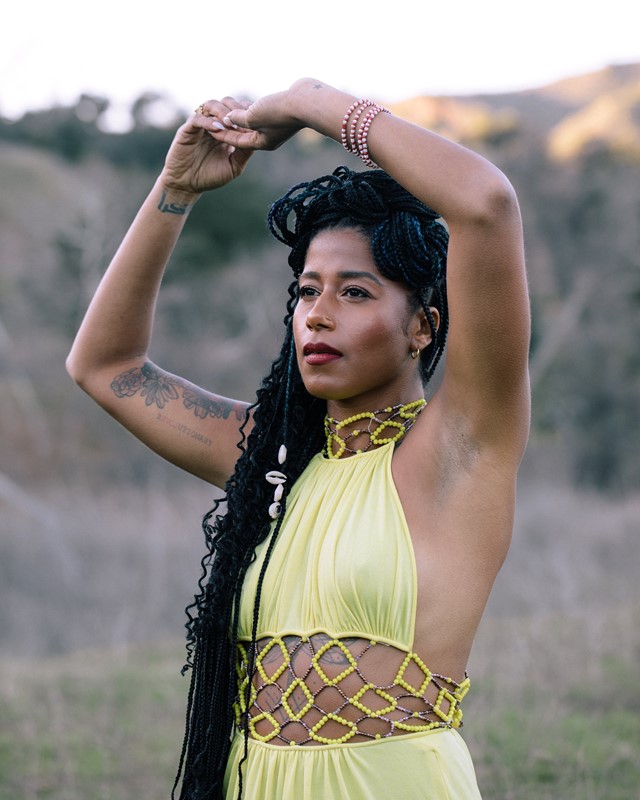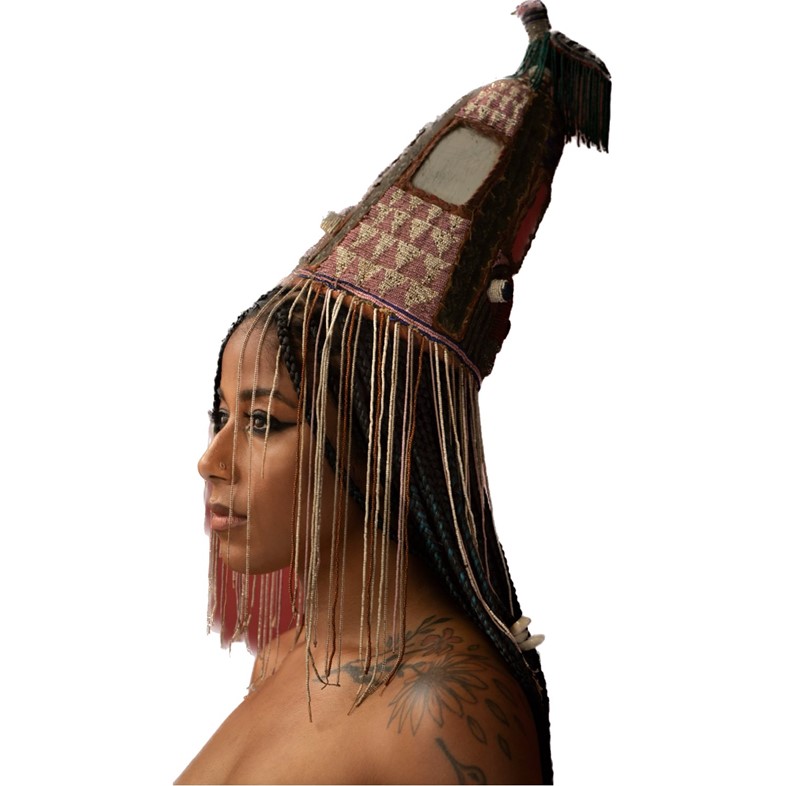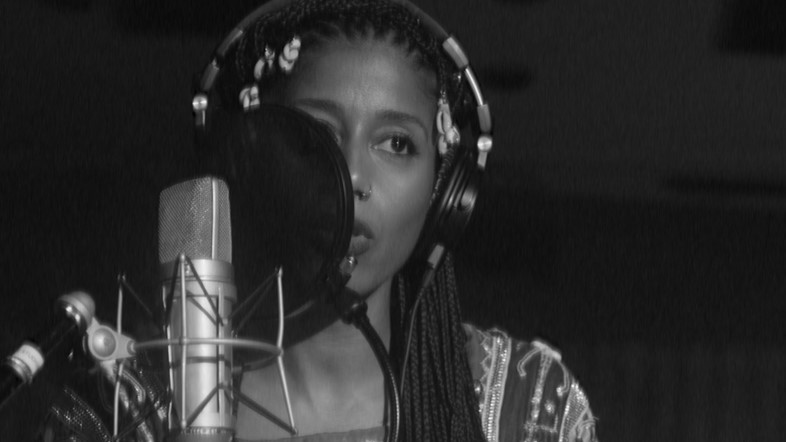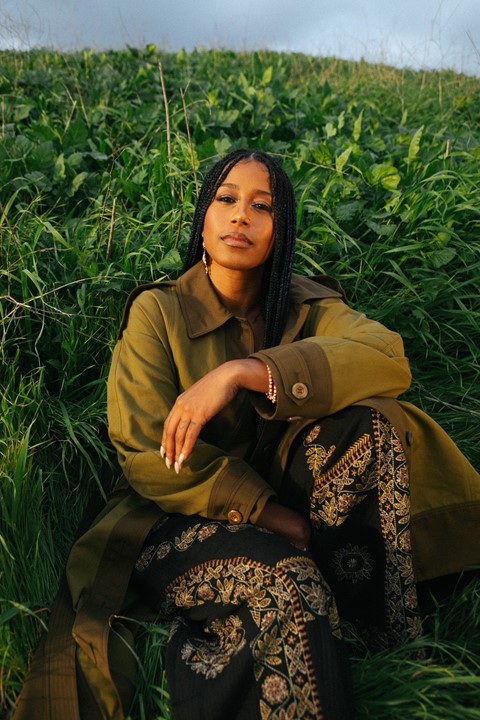As she releases her debut album when the poems do what they do, aja monet talks about poetry, the expressive power of music, and legacy
“Who’s got time for poems, when the world’s on fire?” asks aja monet on for sonia, an elegy that appears on her debut album when the poems do what they do, released by Drink Sum Wtr. The poem’s title is a tribute to the poet and activist Sonia Sanchez, a leading figure of the Black Arts Movement; of Sanchez, monet writes, “She who shivered the sky / rain showers and sunsets born of her blessing / the flesh of her words / kindred sister who wrote for daughters / of a movement.” monet calls on the work of Sanchez – as well as poets June Jordan, Pat Parker and Carolyn Rodgers – and insists, “But who will feed our activists, our organisers freedom, if not the poets?”
monet, who was born and raised in Brooklyn, created a name for herself within the New York poetry community as a teenager during the early 00s. At 19, she became the youngest poet to hold the Grand Slam Champion title at the historic Nuyorican Poets Café and has released two collections of poetry since – The Black Unicorn Sings (2010) and My Mother Was a Freedom Fighter (2017). “I had always wanted to make a record,” says monet. “I’ve had the sense of doing music before, but never live instrumentation. I found that when I performed live with musicians, it allowed me an opportunity to really expand and express myself in a way that I can’t when it’s a rehearsed, sterile recording process.”

monet recorded the album during lockdown at Westlake Recording Studios in Los Angeles, where legendary albums like Michael Jackson’s Thriller and Alanis Morissette’s Jagged Little Pill were made. A group of masterful jazz instrumentalists support her: Chief Xian aTunde Adjuah (formerly known as Christian Scott) on bow and trumpet, Weedie Braimah on percussion, Luques Curtis on bass, Marcus Gilmore on drums, Elena Pinderhughes on flute and Samora Pinderhughes on piano. On the album’s opening track i am, a bevy of drums thrums in joyous cacophony alongside monet as she revels in celebration of herself, and a feeling of initiation begins.
For monet, the album’s title, a line from for sonia, encapsulates what she hopes the “energy of the album could give to people.” “I think we often have a very rigid, elementary idea of poetry because [the American] education system is not the strongest when it comes to art education and literature,” she says. “So unless you go to a really good liberal arts school, you’re not having an intense analysis in relationship to poetry. While poetry for me is very much rooted in the oral tradition, I wanted people to know that I come from the Black radical tradition, where there is an understanding that the work we do is cultural work, and that the poems have a sense of urgency and presence for them to be fully embodied. It’s not just the written word. It’s also how one lives, how one loves, how one feels, how one breathes. And what do we do with that poetry?”
monet puts poetic will to the test on when the poems do what they do; she deftly manages to chronicle our times while also tracing her own process of grief, empowerment and enlightenment. She radiates power and is equal parts humorous and wise: “my love be book smart / be Google / be Google ready.” As an artist, monet also embodies a lived awareness of history, made evident by her sensitivity to legacy and tradition. “I come from a community of people that really value poetry. I was raised under the tutelage of The Last Poets. That entire tradition and legacy of poetry is keenly aware of the ways in which the word is dancing with sound and how words are symbols of sound; they hold sound in a specific way,” explains monet. “Tone is really the device that shifts the impact and the movement of sound between words. I pull from so many things outside of even just poetry, from hip-hop to jazz to visual art.”

The breadth of monet’s vision – as well as her fondness for archival material – is evident in the visual accompaniments released for the singles why my love? and the devil you know, both directed by monet. In the former, a kinetic collage of archival footage kaleidoscopes and transforms into a cutout of monet. “There’s all of these other women in the video, Black women who for me were women that loved deeply but were never truly loved [in] the ways that I feel like they deserved. They are the embodiment of ‘why my love?’ They are the ones that have asked that question over and over again,” Monet explains. “Oftentimes when we’re in relationships as Black women, as women in general, people only see us in fragments. They don’t see us as a whole being, as many moving dreams, visions, and ideas that have shaped us. In the video for the devil you know, whose sumptuous black and white and frenetic pacing recalls work by artists Ming Smith and Arthur Jafa, the boundaries of time and space dissolve as footage from the live recording session shapeshifts in and out of the archival. Through monet, it’s impossible not to feel the aliveness of poetry, its relationship to remembrance and grief, the living and the dead.
monet begins touring when the poems do what they do this summer. “Live performance, especially after the lockdown, is water to the people. It should be a right that people have access to that experience, which expands and deepens and can help decolonise the imagination,” she says. “When people gather into a room to listen, to embody, to experience … it can do so much for the heart and the spirit.”

In keeping with monet’s radical spirit, her plans for the tour are untraditional. “I’m developing this concept which is less of a band and more of a collective and a value system, inspired by movements of the past but recognising that oftentimes in the capitalist market-driven society, one sees the orchestration of a band or a unit of people that come together and they reproduce the same thing over and over again on tour,” monet explains. “We want to disrupt that. We don’t want to replicate the album in any way, shape, or form. I'm looking forward to bringing the poems to the people and engaging with the audience, seeing how we can improvise together and the ways in which we can change, move, sit with and lean into the work.”
In the beginning of for the kids who live, the album’s final track, we hear a member of the ensemble tell monet she can trust them enough to improvise. “This is about you being free … what’s the best way to teach people to be free? … You don’t know the instrument, but you know how to be free.” “Let us find you,” someone else says. monet’s on the balafon and when she lets herself go, you feel the force of an artist who has – if only for a moment – attained absolute freedom. It’s the same vision of freedom felt on the ending crescendo on unhurt, encapsulated in a phrase at the very end of the devil you know I can’t unhear: “a voice bravely raising up / reverberating / new visions.”
when the poems do what they do by aja monet is out now.
